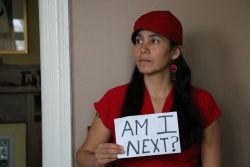Halifax Media Co-op
News from Nova Scotia's Grassroots
Pjilasi Mi'kma'ki - Episode 5: The human side of the inquiry
Interviews with survivors of #MMIW
According to a 2014 report by the Royal Canadian Mounted Police, between 1991 – 2012, 3,989 women in Canada were murdered. Of these murders, 705 were Aboriginal women. This accounts for approximately 18% of all female murder cases. This, despite the fact that in the 2011 Canadian census, only 4.3% of the population self-identified as 'Aboriginal'.
The statistics become ever more troubling when we look at women murdered outside of 'Metropolitan Areas'. Here, of the 1,555 women murdered between 1991 – 2012, 426 were Aboriginal women. This is approximately 27% of all non-metropolitan female murders.
Of the murder cases where someone has been charged, according to the Native Women's Association of Canada’s database, 16.5% of offenders are strangers with no prior connection to the murdered Aboriginal woman or girl. This, compared to data collated by Statistics Canada, which reports that between 1997 and 2004, only 6% of murdered non-Aboriginal women were killed by strangers.
----
When I think about it, when I think that it is more likely that our native women will go missing or be murdered, for me, living in a city right now, I could just be out somewhere, doing something. When I'm alone, I could go missing, be murdered, and I'm just out here minding my own business, trying to be a human being like anyone else.
People would never think that it can happen to you, but it can.
You can be the most loving and kind person in the world, but it might still happen to you as well. And instead, if you're a native woman, you'll be branded as an alcoholic, or a 'hooker', or an addict, a slut, and you're nothing but garbage and nobody will care about you anyways. You live in a hell-hole anyways and you're disposable. So we don't matter.
But you know what? This is going to stop now. We are fighting back. And this is our land. And we're going to protect our women, our nieces, our daughters, our aunts, our sisters. And we are taking our power back, with you or without you.
The interviews you will hear in this episode of the podcast are from three mothers of missing or murdered Aboriginal people. They're three beautiful mothers, talking about their children, and how their lives were destroyed when all they wanted was to succeed in life and help their people. In a flash though, that is taken away.
The site for the Halifax local of The Media Co-op has been archived and will no longer be updated. Please visit the main Media Co-op website to learn more about the organization.



